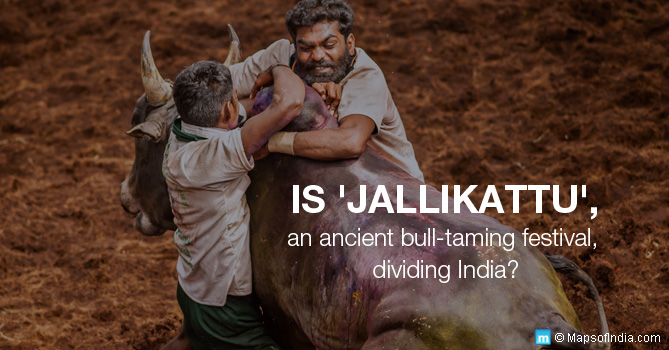Supreme Court may have banned Jallikattu, a sport that involves taming of bulls but that has not stopped people from protesting across Tamil Nadu, the state where this “sport” has been played with gusto for centuries.
Recently, in clear defiance of the apex court’s orders, people at Palmedu, Madurai have let loose bulls. There has been plenty of frenzied excitement all around as well, even as people have taken to the streets to protest a decision that they clearly didn’t like. In fact, situation has reached such a head that in the last couple of days of Pongal, 40 people have been arrested for attempting to violate the ban on Jallikattu.
A lot of people – especially the farming community – are under the impression that if they don’t celebrate Jallikattu this year it would bring bad omen for their harvest.
Is Jallikattu cruel and dangerous?
Before Jallikattu was banned by the Supreme Court it had laid down some special conditions in 2008, in order to make sure that the bulls being used in Jallikattu were being properly tended to, but as may be expected, they were disregarded in the most blatant manner possible.
The Animal Welfare Board of India watched this “festival” from 2008 to 2014 and gathered enough evidence to suggest that the “sport” is an inherently cruel one. It was pretty evident that no matter what conditions were laid down, only complete banning of the “sport” would save the bulls the misery and suffering that they endured while being forced to partake in the “game”.
In fact, it also puts at risk the “human beings” that take part by way of playing and watching it.
Is it addictive?
From an outsider’s point of view this “sport” may be a cruel one, but for people in Tamil Nadu it represents a glorious part of their tradition, something that they have clung on to in a fervent manner for centuries.
Jallikattu is also known as Eru Thazhuvuthal, which means embracing the bull. From a logical perspective it is quite dangerous to even watch the game, because you never know when a frightened or agitated bull would spear you.
You might as well be an audience member but that does not guarantee your safety. However, for the Tamils who love this it does not matter. For them, even the thrill of watching the bulls come through the vaadivaasal is second to none. They just go berserk right from the start when the bulls come onto the arena and even the possibility that their life may be at stake does not bother them.
How have people reacted to the ban?
The situation has become pretty grave now considering the fact that people have refused to take the Supreme Court’s orders lying down. In fact, people have been taking to the streets to protest the said ruling.
Already Alanganallur (in Madurai) has seen hundreds protesting the ban and they have been arrested by the police as well when the protests have gone well into midnight. The protesters include both men and women and they have been hauled up in a couple of wedding halls in the area.
These arrests have further angered the local people and that has seen an extension of protests. The said arrests have also been criticised by MK Stalin, Leader of Opposition in Tamil Nadu Assembly and Working President of Dravida Munnetra Kazhagam (DMK).
What are its supporters saying?
The supporters of Jallikattu state that it has nothing to do with cruelty and is instead a process of selecting the right bulls to breed. According to A Sarvanan, a spokesperson for DMK, the process of maintaining a bull is rather expensive. Normally, the farmers in Tamil Nadu depend on temple bulls in order to help them complete their daily chores, and it is through Jallikattu that these bulls are chosen.
In the “game” the bull has to escape before any of the participants can get hold of his hump, while for the “players” the challenge lies in holding the bull down by its hump and taming it. You need to hold a bull’s hump for three seconds and you would be declared the winner. The basic idea here is to test which bulls are the strongest ones.
How has the authority handled the issue?
Apart from the 30 arrests and 240 detentions so far the police has also had to resort to lathi-charging in order to disperse the unruly mob. In fact, a Jallikattu was organised on January 16, 2017 in clear defiance of the Supreme Court’s orders.
Police officers have also had their hands full with people frequently organising rallies and shouting slogans against the police, the Indian Government, and People for Ethical Treatment of Animals (PETA).
They have also had to deal with people organising sit-ins near the venues where Jallikattu is traditionally held. Apart from taking out rallies, the supporters have also created a law and order situation by blocking road traffic and asking for the release of arrested youths. Vijayendra S Bidari, the District Superintendent of Police in Madurai, has asked protesters to organise peacefully.
Read more…
The Cow and Bull Story: A Throwback to our Traditions
Despite Prohibition, Devadasi System Still Continues in India




